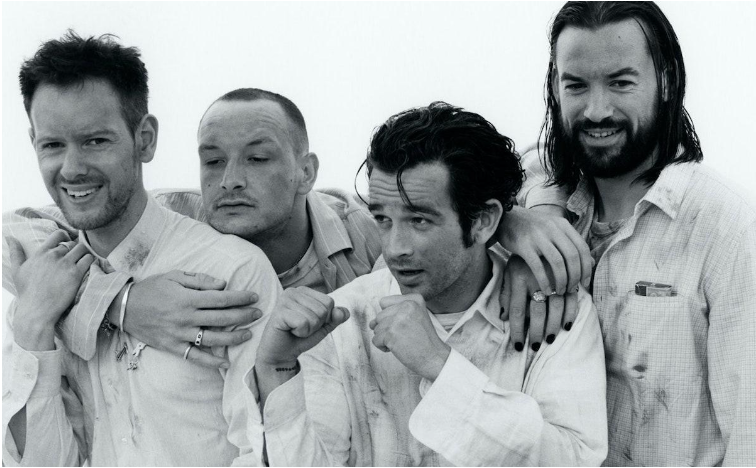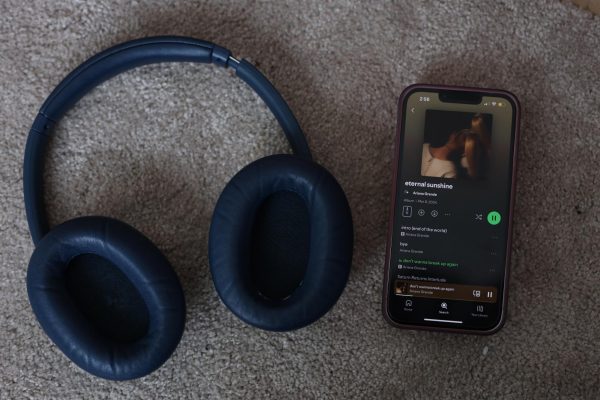“Being Funny in a Foreign Language”: A Shifted Perspective of Life
The 1975 can be associated with sentiments of nostalgia for many members of Generation Z, as their first self-titled album was released in 2013. Their most recent album, “Being Funny in a Foreign Language” caused waves in popular culture by breaking the four-year hiatus in their production. The album is the shortest of their discography but offers the most hopeful and endearing message. A large emphasis is placed on the most popular theme in music: love. In the context of the last three years, the album’s hopeful voice is refreshing compared to their previous work. The band has generally gravitated towards existential tones in their music, often following the despairs of the life of Matty Healy, the lead singer. In addition, The 1975 acquired a new production feel as they worked with the esteemed Jack Antonoff to bring the album to fruition. Antonoff is most known for his production of Taylor Swift, Lana Del Rey and Lorde. While the angst and variation of their previous self-produced albums are missed, “Being Funny in a Foreign Language” roped me in with the seemingly cliché sentiments of romance while also acknowledging the painful aspects.
The signature inclusion of an introduction track titled “The 1975” secures a sense of continuity throughout all their projects. This first song, while connecting the album to the brand of The 1975, also exhibits the intended tone of the album. An initial sense of apathy and impending doom settles in as the band lists off plagues of current society. Healy finds himself “scrolling through hell” while dealing with the gloomy reality of mental illness and the cages it binds people within. In listening to the track, I felt a connection to a younger version of myself who observed adolescence in the close distance. Everything I had been taught to beware of was creeping into my life, and I didn’t know how to silence the alarms telling me to skip through all the difficult decisions.
Now approaching the end of my teenage years, the impending doom feeling has not dissipated. It has grown more informed about the reality of change. Healy repeatedly expresses his apologies in the line, “I’m sorry if you’re living and you’re seventeen,” which is intended to connect to the song “Girls.” In the 2013 track, The 1975 says “she can’t be what you need if she’s seventeen,” highlighting the immaturity and confusion that is associated with these youthful years. On hearing the line, I felt chills sneak onto my skin. I have a sense of pity for my seventeen-year-old self, as I navigated every first that was thrown my way. People not being able to express their love for me and vice versa was a common theme that weaved throughout those years, which is the type of pain that The 1975 exemplifies in the first track.
After the hindsight allusion to adolescence, Healy and the band seem to come to resolution as the album progresses. The songs “Happiness,” “Looking for Somebody (To Love)” and “Part of the Band” all evoke themes of stereotypical love songs with upbeat production. Matty Healy is experiencing the desperation of love as seen in “Happiness,” he’d “go too far just to have” the one he loves “near.” The imagery of these songs effortlessly ties together the beauty and pain that is associated with falling in love. While involving these same sentiments, I personally believe that “All I Need To Hear” paints the most accurate and heart-wrenching portrayal of love. Healy feels so comforted in the company of his lover that nothing else will fill their void that they leave. Although he’s “been told so many times before” that he is loved, the only thing that matters is the love that his partner can offer. The song is so beautifully produced, yet you can hear a twinge of unrequited love in Healy’s voice. The 1975 accurately portrays the ebb-and-flow nature of intimacy thus far in the album, and “All I Need To Hear” epitomizes this notion.
Finally, my favorite track on the album, “About You,” contributes once again to the cyclicality of The 1975’s work. Healy has revealed that, musically, the track is a continuation of their song “Robbers.” “About You” explains that one can never forget the impact that love has had on them. He is desperately clinging to the memories he created with his lover and asking them to “hold on” in hopes of a better future. The whimsicality of “About You” connects the track to “Robbers,” as it also pleads for patience in a love affair. The sentiments of the song aid in the closure of the album. The 1975’s new direction in “Being Funny in a Foreign Language” production-wise was a risk that gave a new dimension to their work.











































































































































































































